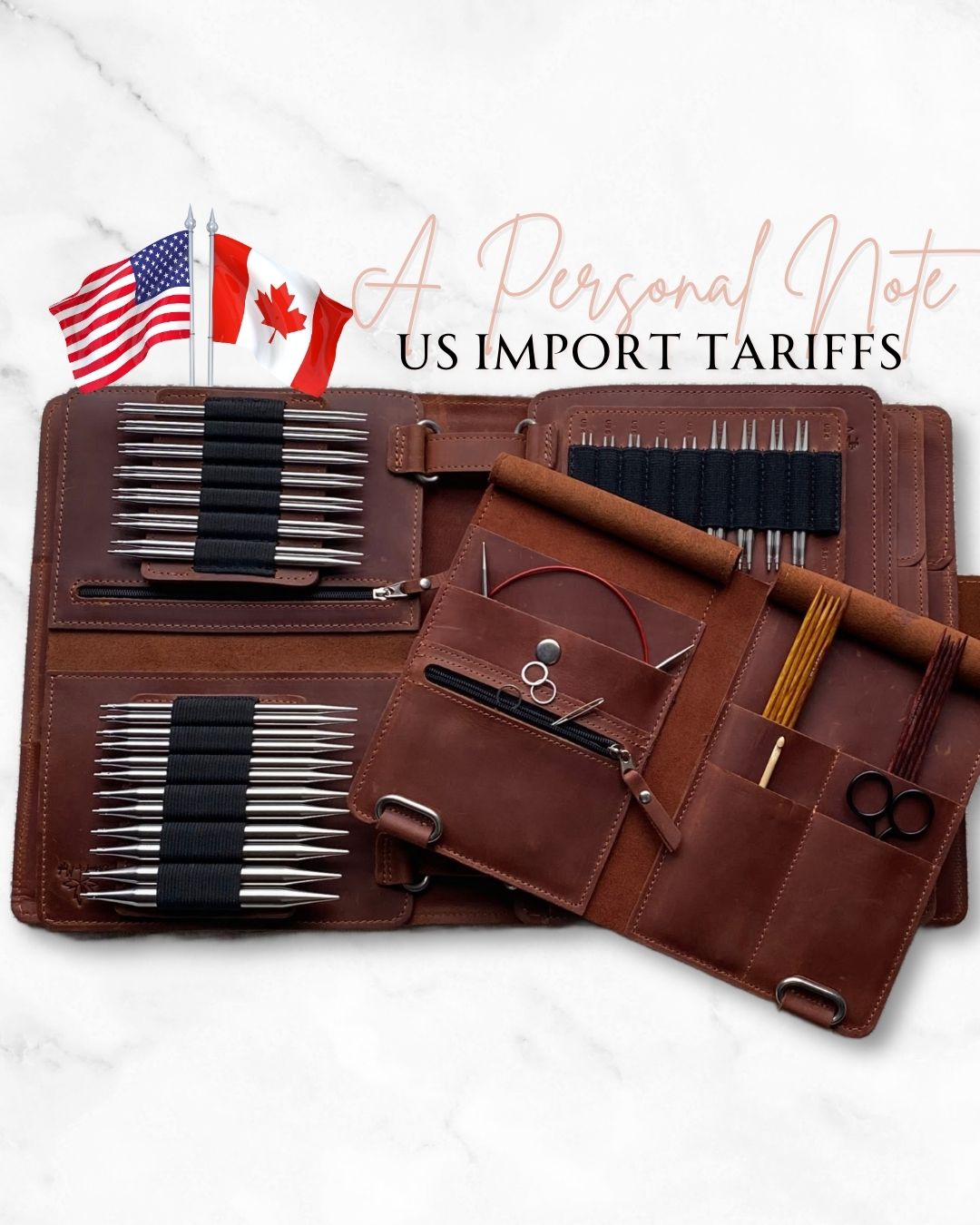Why I’m Writing This
I don’t usually do personal posts, but this moment feels different. Across North America, small businesses like ours, artisans, and makers are facing an unprecedented disruption. The sudden removal of the U.S. de minimis exemption has blindsided many of us with devastating ripple effects.
If you’re a U.S. customer, this could mean delays, returned shipments, higher costs, or paused orders from many small makers you love. You might be feeling frustrated that you're being blocked from purchasing from some of your favorite maker neighbors, including Thread & Maple. But believe me, suspending shipments to the U.S. is our absolute last resort. I did not make this decision lightly and just like the hundreds of other Canadian small businesses, I painstakingly considered all available options. This is the last thing any of us want.
You might be seeing a lot of conflicting information both in the news and social media - mainly because things are changing so quickly that it's hard to keep up with the facts. I want to lay out what’s happening, why it matters for us and for you, and how we can try to navigate it.
What Changed and Why It’s Not Business as Usual
- The de minimis exemption that allowed US $800 or less parcels to enter duty-free was initially set to be phased out in 2027. It was suddenly suspended, with less than a 30-day notice period, giving virtually no time for small businesses to adapt.
- This isn’t just a tariffs shock—processing, brokerage, and inspection fees are now inflicted on every single parcel, even if technically exempt under trade agreements. Even a $20 order can incur dozens of dollars in fees, red tape, and delays due to administrative overload.
- Canada Post is not accepting U.S.-bound parcels, unless they are DDP (delivered duty paid), meaning the seller pays for all duties and additional clearance costs.
-
Canada Post does not have a DDP option nor the systems in place to collect duties from senders. The only option for them, as for other international postal carriers, is to partner with a 3rd party (in their case Zonos), to facilitate this process. This integration was hastily implemented, with inconsistent and confusing instructions shared mere hours before the policy went into effect. The Zonos platform was down all day Friday, customer support lines drowning, nobody able to actually get it to work.
- Over 30 countries had to suspend shipments to the U.S.. This is because U.S. Customs & Border Patrol only issued instructions on duty collection less than 2 weeks before the suspension. They were met with a flood of questions, some of which were answered literally a couple of days before the policy went into effect.
- Canadian-made goods shipped via Canada Post/USPS incur 35% IEEPA tariffs. Canada Post is not honoring CUSMA, a longstanding free trade agreement between Canada and the U.S. which allows goods sourced and manufactured within North America to cross borders duty-free. A skein of yarn produced and dyed in Canada should, by law, be able to cross the border into the U.S. tariff-free. Instead, it will incur a 35% tariff regardless. This is because this de minimis suspension happened so quickly, they haven't been able to set up the systems and staff to actually process the flood of CUSMA certificates from sellers.
- The only option to get parcels across the border is to use private carriers, like DHL, UPS and FedEx. The problem is that these carriers are not only much more expensive, but they also act as the customs broker for parcels and charge unpredictable and extremely high brokerage and processing fees, often in excess of the tariff duties for low-value shipments. They are also overloaded as they went from hundreds to thousands of daily parcels requiring rigorous customs processing overnight.
The Administrative Nightmare and Lost Orders
I see a handful of Canadian shops continuing taking U.S. orders, promising a certain (often very low) duty % charge that customers will pay to release their parcels, or collecting duties at checkout and promising a speedy and seamless delivery with FedEx. The truth is, nobody can promise anything at this time. This change is all but 48 hours old and we are only now going to see what this means for us and for our customers. And so far, it's disheartening.
For example, just this week one of our FedEx shipments that was sent to a customer on Monday was rejected on Friday because a single ballpoint pen required unexpected EPA certification. ChitChats truck shipments are being turned away if even one parcel hasn’t had duties prepaid, meaning entire batches from multiple businesses are rejected and rerouted—at high cost in time and money.
The duties are just a part of the burden. Every single item purchased has to be classified, labeled and have its country of origin determined. For sellers of vintage goods, bundles, assembled products, or simply shops with a lot of different items like ours, this is a challenge. Some items, like our wooden knitting notions for example, require a special TSCA certificate stating exactly the genus of wood and the percent make-up of that wood contained in the piece. We found out yesterday that because Ukraine is sanctioned, there is heightened scrutiny over Ukraine’s manufacturing regions. We have to prove that our items are made in a part of Ukraine that isn't occupied by Russia in order to have our leather goods accepted by U.S. customs.
Many shop owners are panicking over what to do with preorders that have already been paid for, which now can't be shipped across the border. A lot of us are solopreneurs, parents of young children, some are caring for elderly parents or dealing with serious health issues, and all of us have a lot on our plates running a small business as it is. We don’t have departments or specialised teams of staff to deal with this - we are trying to manage it all on our own and stay sane.
Some people are crying, some are lashing out, others are withdrawing as though this isn't really happening. It is extremely stressful and chaotic to say the least.
The Broader Impact
- American small businesses who source materials or supplies overseas now face extreme disadvantage. Even if they try sourcing domestically, some items are either unavailable or incur much greater costs. With no time to adjust and try to find solutions, many are left in despair.
- Dozens of international postal services, including the UK, Germany, New Zealand and others have halted shipments to the U.S. for the same reasons as we have - uncertainty about the new duty-collection process and impossible timelines to implement their requirements. This directly impacts American consumers and businesses.
- The de minimis on Chinese-origin goods was already suspended in May of this year, so the big retailers selling low-cost Chinese goods who are still standing, are standing strong. They have already had months to establish local distribution centers and adjust. This makes the blow on small business that much greater. Many 3rd party logistics companies in the U.S. aren't taking on more clients - they're full to the brim.
- A lot of Canadian small businesses, including us, have 50-80% of their sales from U.S. customers. Not being able to take U.S. orders even for a few weeks is very difficult, especially for those who rely on their sales to pay the bills. A lot of them ship exclusively with Canada Post as it's the only accessible option. This means their whole business is at a stand-still with no way out.
- Ukrainian businesses, including our leather artisan team, are also impacted. It’s another layer of red tape and even more instability for people that already deal with war, displacement, and sanctions.
Some American small businesses are welcoming this change, as for years foreign companies have been flooding the market with cheap goods, making it extremely difficult to compete. The U.S. $800USD de minimis is amongst the most generous of any country by a long shot. Canada's is CAD$150 for duties and $40 for taxes , for example. So I totally get it that it had to come down. And we knew it would - it was in process. However, I doubt anyone is applauding the manner in which it was implemented, and wouldn't wish to be put in a similar situation as we are in now - scrambling, panicking, with no time to think.
This is not about whether tariffs exist, they do everywhere. It’s about the rollout being impossible for small businesses to adjust to.
Politics
Although many people assume this was a Trump policy, the push to reform the de minimis exemption actually started under the Biden-Harris Administration in September 2024. The intention was to curb abuse by overseas e-commerce giants (especially China-based platforms like Temu) and to stop unsafe or illegal products from slipping through. Biden’s plan called for excluding tariffed goods from de minimis eligibility, forcing more data collection on small parcels, and requiring safety certifications, all moves meant to protect U.S. industries. And I agree with this, I would want the same if I were an American. What I don't agree with, is the sweeping indiscriminate manner in which tariffs and trade policies are being applied, constantly changing, making it impossible to make informed decisions as a business owner or a consumer. Leaving thousands - from makers and small businesses, to postal workers and customs officials who now have to deal with these mountains of paperwork, completely underwater.
An appeals court recently ruled many of Trump’s tariffs illegal—but the tariffs remain active through mid-October, pending appeal or potential Supreme Court review. Given that 6/9 justices were appointed by republican presidents, 3 of whom Trump selected himself, my expectations of reversal are low. Even if some of the tariffs are rolled back, I don't see the de minimis suspension being repealed. Even tariff-free goods will still incur processing and customs brokerage fees. Not to mention taking ages just to make it through due to the sheer volume of shipments now requiring meticulous inspection and paperwork.
And for a lot of indie dyers and independent makers, the burden is too big to bear. Private carriers like FedEx or UPS who could potentially get their items across aren’t a viable option. Shipping would cost more than the yarn/item itself. For many, Canada Post is the only option, and with its current refusal to honor CUSMA on postal shipments and their inability to deliver a working DDP solution for Shopify merchants as promised, that option is broken. This is why a lot of Canadian small businesses are unable to take U.S. orders.
Why This Really Matters
Sure, tariffs are part of global trade, but they rarely come without warning. This level of rapid change, uncertainty, and administrative chaos is extremely challenging to small businesses like ours. For large corporations, it’s an adjustment; for many independents, it may be an existential crisis. These aren’t just policies, they’re livelihoods.
What Small Businesses Can Do
- Test shipments to trusted friends or family in the U.S.—know your real total cost, not just estimates or theoretical calculations. See for yourself, the end-user experience before promising anything to your U.S. customers.
- Partner with peer businesses. Indie dyers and independent makers are some of the most collaborative people I know. From joint collections to knit-alongs, that spirit is key. Teaming up on cross-promotions, pricing/shipping strategies, and simply supporting one another. Our IG group of 40+ Canadian makers has been a lifeline. I've learned so much and really feel fortunate to be a part of such a kind, caring and supportive group. If you're a Canadian maker impacted by this, leave a comment here and we can add you to the thread.
- Check out our resources page for fellow Canadian small businesses.
- Above all, don’t assume ‘business as usual.’ This is a moment to test, measure, and adapt, not to keep shipping blindly.
What Consumers Can Do
- Show empathy & support. If you're a knitter or crocheter, whether American or Canadian, who loves indie yarn or handcrafted gifts for knitters, your words of encouragement matter right now. Even if you’re not placing orders while this shakes out, share a post, leave a supportive comment. It means a lot.
- Spread awareness. Tag small makers, share their stories, or even pick one brand a month to support if you can. Show off a project you made with their yarn. That kind of visibility can help them weather the storm.
- Leave us a review on our Google Maps profile - this can really boost our SEO and help us reach more local customers!
- Check out our Support Canadian Makers Page to discover new brands.
- Reach out. If you’ve been impacted by fees or delays, please reach out to us or the maker you ordered from. Open communication helps us all navigate this together.
What We're Doing at Thread & Maple
We have paused shipping to the U.S. as of August 26th because we don’t want our customers hit with unexpected fees or delays. We are testing DDP shipments to our internal team in the U.S.
I *hope* that by September 10th we'll be able to resume shipping. When we do, all U.S. orders will ship DDP (Delivered Duty Paid) with all the required classifications and certificates, so there are no surprise costs on your end and your parcel moves through customs as quickly as possible.
We have also secured a 3rd party warehouse in New York so core items can ship domestically. Shifting the majority of our inventory to be shipped by a 3rd party is no small feat. We stock nearly 1000 SKU’s spanning multiple countries of origin, make on-the-fly assemblies, include hand-written thank-you notes and take painstaking care in packing your orders. The added costs, soon-to-be constant import customs processing, complexity of logistics, and new systems required to enable us to manage inventory in multiple locations is overwhelming. It is like preparing for Rhinebeck. Every month. But - I am determined. I have worked very hard for many years to build this business. Dozens of workers in Ukraine and our small (yet mighty) team are counting on me. We are doing our best to have it fully operational by early October.
This isn’t just about trade rules—it’s about people, communities, and the small businesses that so many of us have poured our hearts into, all trying to stay afloat. I do believe things will get better. Canada Post will honour CUSMA, tariffs will normalise, customers and businesses will adjust. But how long will all this take? And how many small businesses can weather this storm?
We’re shaken, but leaning on each other. If you’re a fellow maker or a customer who cares, we’d love to hear from you. Your support and connection truly keep us going.
Thanks for reading and for being here,
Olga


